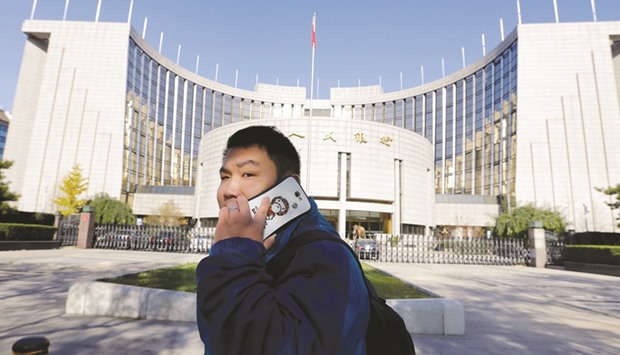Three years ago, China’s central bank engineered a cash crunch to force commercial banks to reduce their reliance on short-term money markets.
Interest rates spiked, spooking global markets who feared a banking crisis was imminent.
Once again, the People’s Bank of China (PBoC) faces the same problem of too many banks relying on short-term borrowing.
But this time, the central bank appears to be deflating the risk with less drama having learnt some lessons from its intervention in 2013.
“In 2013 it seemed to be very quick – i.e. we’re going to turn off this tap and you’re going to have to fend for yourself,” said Jonas Short, head of the Beijing office of consultancy NSBO Policy Research.“There’s no doubt there has been far better co-ordination this time.”
The central bank manages the amount of cash in money markets to ensure that commercial banks have sufficient funds to meet the needs of the economy.So, co-ordination is critical to make sure banks do not misunderstand the central bank’s intentions.
In 2013, the central bank abruptly curtailed its lending in money markets to force rates higher and slap some banks on the wrists for relying too heavily on short-term borrowing to fund risky longer-term investments.
But the sudden rise in rates prompted panic in the broader market and banks held back from lending, adding fuel to the rise in rates.
Overnight rates jumped as high as 25%. In the days that followed, sources told Reuters that the central bank had held high-level meetings with banks, telling them to expect tighter cash conditions.
But bank traders on the front line of the market were largely left in the dark, helping explain the panic when funding suddenly tightened.
When the PBoC finally intervened to calm markets it did so behind the scenes, extending special short-term loans to struggling banks without public announcements, fuelling a rumour mill on bank insolvencies, which traders said led some banks to hoard capital rather than lend it out.
The central bank did not immediately respond to a request for comment.In August this year, traders worried they were heading for a similar roller coaster ride when the central bank warned that small and medium-sized banks were again over reliant on overnight borrowing to fund longer-term bond positions.
This time, however, rather than working behind the scenes, the central bank telegraphed its intentions to the money markets more clearly, traders said.Central bank officials met with commercial banks and urged them to move away from a dependence on borrowing via overnight bond repurchase agreements, the most common form of short-term interbank lending in China.
Rather than abruptly cutting off lending as it did in 2013, the PBoC sent banks notices that it would begin offering more expensive 14-day money market loans, rather than its usual daily 7-day loan offerings.
It was the first offering of 14-day money in six-months.
Over the following days, the central bank sent banks a series of other notices, querying their demand for 28-day loans and lowering the rate on that tenor as an incentive for banks to switch over from shorter-term borrowing.Unlike 2013, cash injections were conducted through the central bank’s regular open market operations and publicly disclosed, rather than unpublicised one-on-one deals.
While rates rose sharply and volatility initially spiked in September, rises have remained far below the panic rates seen in 2013.The result, so far, seems to be a much more orderly deleveraging and extension of lending tenors, traders said.
Overnight repo volumes in China’s interbank market fell sharply in September to 39tn yuan ($5.8tn) from August’s record high of 52.3tn yuan ($7.8tn).The volume of more expensive 14-day repos rose to a record high of 2.9tn yuan, triple the 848bn yuan volume in August.
Still, the PBoC is by far the least transparent of key global central banks.
It rarely explains its actions and keeps markets guessing on key policy decisions such as changes in interest rates.There is no public schedule for policy reviews and any steer on policy is extremely vague.
And while the Federal Reserve and European Central Bank are relatively insulated from political influence, major decisions on policy in China need the approval of the cabinet.

A man uses his mobile phone while walking past the headquarters of the People’s Bank of China in Beijing. PBoC officials met with commercial banks and urged them to move away from a dependence on borrowing via overnight bond repurchase agreements, the most common form of short-term interbank lending in China.
